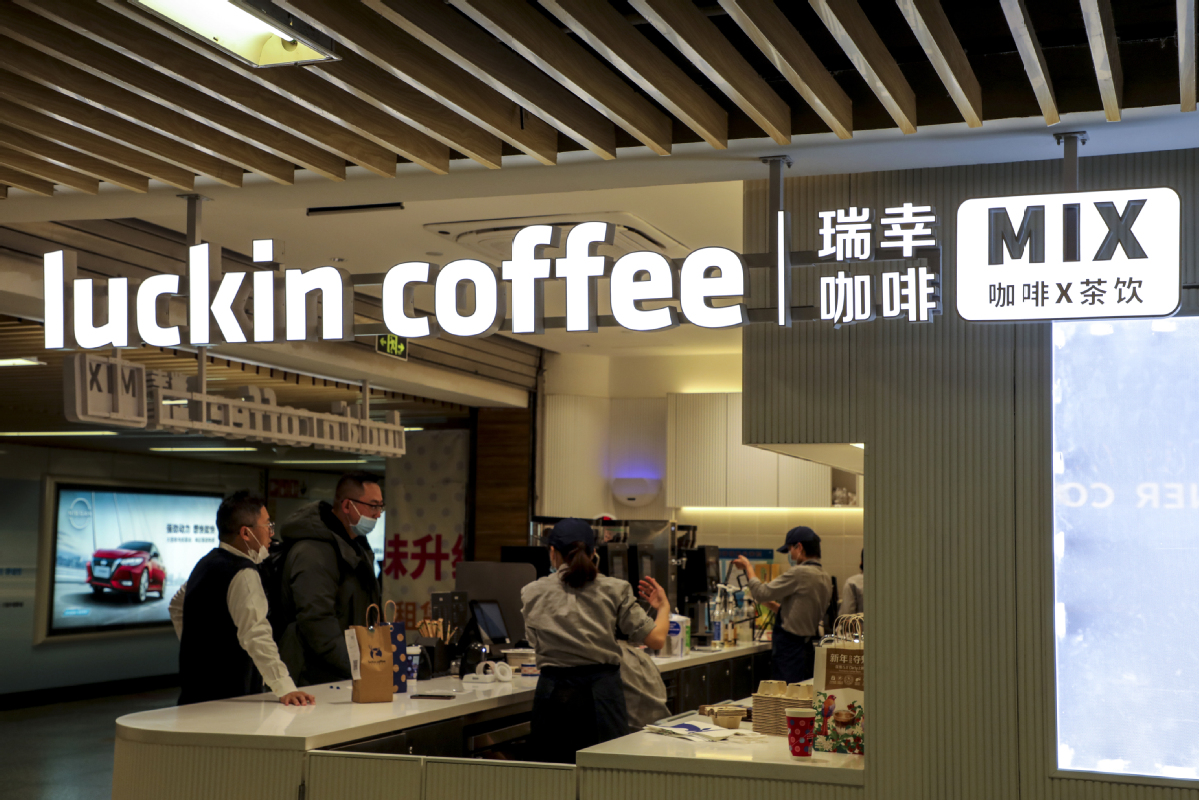Coffee chains use collaborations to boost long-term growth


For a heavy coffee drinker like Wang Wen, the hunt for a new coffee flavor is the delight of her day as she works as a marketing executive for an online tourism platform in Beijing.
On April 12, she bought a coconut juice latte.
It is a new product jointly introduced by domestic coffee chain Luckin Coffee and the Coconut Palm Group-a Haikou, Hainan province-based leading juice producer.
The product-with coconut milk topping and wrapped with the flashy Coconut Palm signature packaging-is the first brand collaboration for the coconut juice producer since its founding.
The impact of linking with a brand that the entire Gen Z consumers have grown up with is exploding.
Wang said coincidentally, all of her team of 12 people in Beijing, Changsha, Hunan province, and Suzhou, Jiangsu province, bought the same drink on Tuesday.
"It tastes more like a tropical coconut juice with a light touch of coffee," she said. The new product sold 660,000 cups on its launch day, according to Luckin.
One of the strengths of domestic coffee chain operator Luckin Coffee is to be able to connect domestic brands to double down on the guochao trend-a Chinese phrase referring to homegrown style, providing continuous innovations that often resonate with local consumers. The benefit of the move is mutual. "The collaboration with Luckin Coffee is pushing the iconic coconut juice brand closer with younger consumers," said Zhu Danpeng, a food and drink analyst in Guangzhou, Guangdong province.
The troubled coffee chain announced on April 11 the successful completion of the restructuring of its debt and its emergence from bankruptcy proceedings.
Guo Jinyi, chairman and chief executive officer of the company, said the day marks the beginning of the new Luckin Coffee and it is now eyeing long-term growth.
Last year, the chain opened more than 350 new stores in the fourth quarter and is one of the largest coffee networks in China by the number of outlets, with more than 6,000 stores as of the end of last year. Of them, 4,397 are self-operating stores and 1,627 partnership stores.
New store openings during fiscal year 2021 stood at 1,221, resulting in a year-over-year store unit growth of 25.4 percent. Many of the newly opened stores are located in third- and fourth-tier cities, suggesting potential for further small-city penetration.
Total net revenues in fiscal year 2021 were 7.96 billion yuan ($1.25 billion), representing an increase of 97.5 percent from 4.03 billion in fiscal year 2020, according to its report.
Meanwhile, Starbucks China on April 12 launched its new series of Goodgood creative beverages and food products, including the "Tomorrow Latte", which encourages consumers to practice lifestyles based on its "Eat Good, Do Good and Feel Good" initiative. Each cup of the "Tomorrow Latte" is sourced from sustainable coffee beans that have been verified with C.A.F.E.Practice to ensure green planting and processing, as well as the use of oat milk and recyclable packaging. On April 4, Starbucks founder Howard Schultz replaced Kevin Johnson as chief executive officer and as a director on the company's board.
Since then, Schultz visited many frontline employees in the United States and held a meeting with the Chinese team online. Schultz recently said in an internal letter, "this is the moment when we continue to accelerate our development in China, a strategic market".
China is the second-largest market for Starbucks in the world, with more than 5,500 stores and nearly 70,000 employees in more than 220 cities on the Chinese mainland. It plans to reach 6,000 stores by the end of 2022.
Canadian coffee group Tim Horton's in China announced it has received an investment of 1.2 billion yuan, providing more capital for the business plan in the next five years, which is to grow the current 410 stores in the country to 2,750 stores by 2026.
Last year Tim's China worked with Metro China, a membership store under the country's leading retailer Wumart Group, to open more Tim's Go stores within Metro China outlets. Tim's Go mainly focuses on delivery services and is expected to open 617 stores by 2026, or 20 percent of its total stores, in China.
According to the on-premise coffee market report of 2021 from UK-based research institute Mintel Group, the number of coffee chain stores has been on the rise due to the major play's expansion strategy and rising investment. The number of on-premise coffee stores is expected to reach 136,000 in 2021, with a growth rate of 5.4 percent. In five years, said the report, the annual aggregated growth rate is forecast to climb to 10.9 percent and the market value to 75.8 billion yuan in 2026.




































